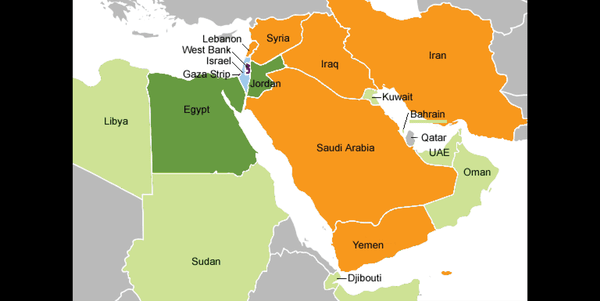The Mossad: Israel’s Intelligence Service
October 23, 2011

The Institute for Intelligence and Special Operations, otherwise known as the Mossad, has been appointed by the State of Israel to collect information, analyze intelligence, and perform special covert operations beyond its borders.
Over the years, the Mossad has expanded into many fields, the most prominent of which are:
Covert intelligence gathering beyond Israel’s borders.
Preventing the development and procurement of non-conventional weapons by hostile countries.
Preventing terrorist acts against Israeli targets abroad.
Developing and maintaining special diplomatic and other covert relations.
Bringing Jews home from countries where official Aliya agencies are not allowed to operate.
Producing strategic, political and operational intelligence.
Planning and carrying out special operations beyond Israel’s borders.
History
The 29 November 1947 United Nations Partition Plan plunged the Land of Israel (Eretz Yisrael) into into a maelstrom of war. The first wave of attacks came from local Arabs. When the British Mandate officially ended and the State of Israel was declared on 15 may 1948, the local Arabs were joined by Arab states, which sent their armies to invade Israel from the south, the north and the east.
Before the State was declared, there were several underground and semi- underground organizations in the Jewish Community (Yishuv) which, naturally, required information for their operation. These included rescuing Jews, “illegal” immigration, deterring Arab mobs, and anti-Mandate operations. The Hagana, the Yishuv’s main military force, established Shai – Sherut Yediot, or Information Service. Shai’s job was to collect information for Hagana operations and to provide information to the Yishuv leadership for its political and military dealing with the Israeli Arabs, the Arab countries, and the mandate authorities. Shai became well established before the state was declared and its chiefs included Isser Harel (Halperin, or “little Isser”), who later headed both the Security Service (Shin-Bet) and Mossad. Other organizations had their own intelligence services to serve their individual needs.
The declaration of the State and the onslaught of the Arab armies dictated new needs: the need to create an intelligence infrastructure, the need to establish an official framework, and the need to define specific spheres of responsibility. These needs were both clear and urgent.
The First Intelligence Services
On 7 June 1948, Prime Minister David Ben Gurion summoned Jewish Agency Political Department staffer Reuven Shiloah and acting head of Shai, Isser Beeri (Bierenzweig, or “big Isser”), who had recently replaced David Shaltiel. The meeting led to preliminary definitions of the nascent state’s intelligence services. Following is the decision quoted from David Ben Gurion’s diary:
A military information service is to be established by the Staff (the General Staff), headed by Isser (Beeri) and Vivian (Haim Hertzog). Shai will be responsible for safety (Security), censorship and counterintelligence.
An internal information service under (little) Isser and Yosef Y. [Yosef Yizraeli, a Hagana national staff member who, in 1948, was appointed the Defence Ministry’s general secretary].
An external political information service – to be headed by Reuven Shiloah. Until the end of the war it will be subordinate to the Defense Ministry and later, possibly, to the Foreign Ministry.
The decision was the start of a long process. In keeping with Ben Gurion’s decision, Reuven Shiloah was appointed head of the Foreign Ministry’s political department, which was to provide an external political information service. He also became the Foreign Minister’s adviser for special tasks.
Reuven Shiloah concentrated mainly on foreign political matters, such as efforts to form alliances with non-Arab Islamic states, e.g. Turkey, and salvaging Jewish assets abroad and bringing them to Israel.
A small Shai station, headed by Haim Ben Menahem, started operating abroad in the summer of 1947. In June 1948, when the political department was established, Arthur Ben Natan was sent to Paris to take over Ben Menahem’s contacts. This operational department, which was by now taking shape, was called Da’at (knowledge).
Things were still not clear-cut. Ben Gurion objected in principle to public acknowledgement of the existence of a security and intelligence service. Thus the political department, defined as an ‘external political information service’, indeed became an independent, covert intelligence agency, but it was still lodged in the Foreign Ministry. This meant that the service’s objectives, tasks, powers, budgets, and inter-service relations could not be legislated. Inter-service delineation was often blurred and forays into each other’s territory were not uncommon.
In April 1949, the supreme inter-ordination committee was formed and headed by Reuven Shiloah. Its members, who later became known as VARASH or the Service Chief’s Committee, included the Shin-Bet, which emerged from Shai, the political department, the military intelligence department and the Israeli Police.
The Israeli Secret Intelligence Service
In July 1949, Reuven Shiloah, a close associate of David Ben Gurion, proposed establishing a central institution for organizing and co-ordinating intelligence and security service. The object was to enhance inter-service co-ordination and co-operation. On 13 December 1949, Ben Gurion authorized the establishment of the ‘Institution for Co-ordination’ to oversee the political department and to co-ordinate the internal security and military intelligence organizations. The institution, or Mossad, was born on that day.
The Mossad started out under Foreign Ministry auspices. In March 1951, with a view to enhancing its operational capabilities and to unifying all overseas intelligence gathering, Ben Gurion authorized its final reorganization. An independent, centralized authority was set up to handle all overseas intelligence tasks. This was called the ‘Authority’ and formed the major part of the Mossad. It included representatives of the other two services at HQ and field echelons. The Mossad broke free of the Foreign Ministry and reported directly to the Prime Minister, thus becoming part of the Prime Minister’s Office.
The Mossad eventually adopted the following verse from the Book of Proverbs as its motto, guide, creative awakener and ideology, but also was as a dire warning:
“WITHOUT GUIDANCE DO A PEOPLE FALL, AND DELIVERANCE IS IN A MULTITUDE OF COUNSELORS.”
Proverbs XI/14
Similar posts
-

Israel Has The Most Moral Military In The World
April 10, 2024In the heart of a region often riddled with conflict, Israel stands out not only for its technologi...
-

The Resilience of the Israeli People
April 2, 2024Visitors from around the world have seen Hamas's October 7th Massacre's destruction in southern Isr...
-

Israel: Small Size, Big Impact
March 21, 2024Nestled along the eastern edge of the Mediterranean Sea, Israel is a land of immense historical sig...
-

Israelis Are Fighting For Their Lives
February 21, 2024By Jonathan S. Tobin The world looks a lot different from Kibbutz Kfar Aza than it does in the U...
-

Over 2 Million Arabs Live In Israel
January 23, 2024In the complex landscape of the Middle East, where diverse cultures and identities intersect, Israe...
-

'Fauda' Star Idan Amedi Injured Fighting in Gaza
January 8, 2024Despite the severity of his injuries, Amedi's father assured Israeli news channels that his life is...
-

Israel Is A Great Country To Live In
December 28, 2023Nestled at the crossroads of the Middle East, Israel stands as a vibrant and dynamic nation, offeri...
-

Dear World: I Don't Care
November 2, 2023By Avi Lewis I don’t care that you sympathize with Hamas I know you wouldn’t tolerate any of ...





















This is great! It is so hard to find any information on the Mossad. They are so mysterious.